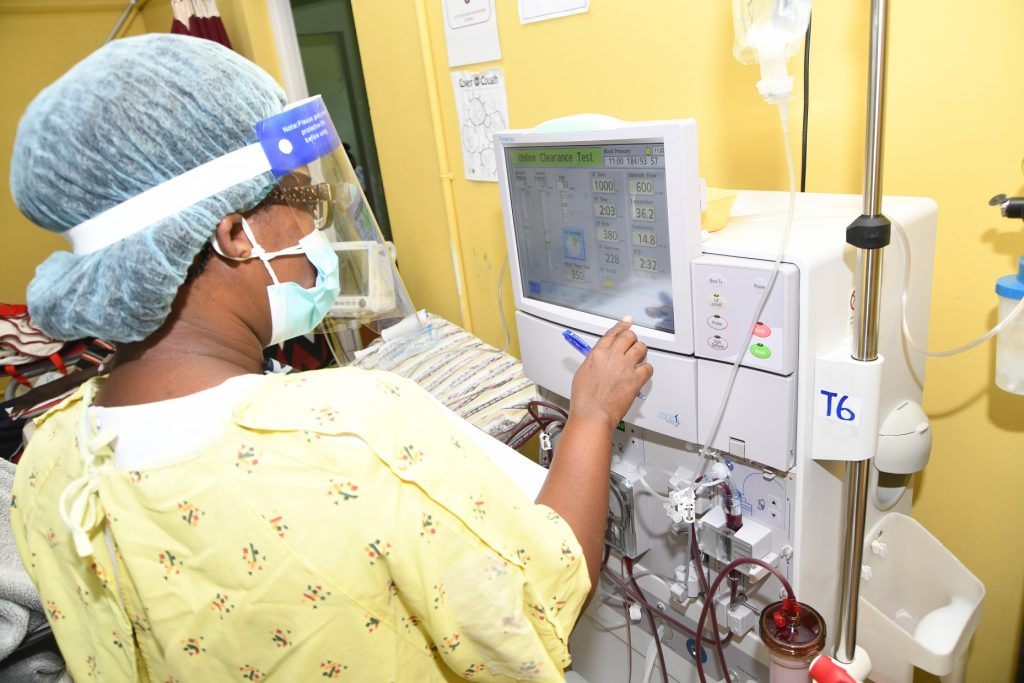Healthcare for renal patients in the southern region of Jamaica has received a boost with the recent installation of eight new dialysis machines at the Mandeville Regional Hospital.
The hospital serves approximately 900 renal patients annually from the parishes of Manchester, Clarendon and St. Elizabeth.
The machines, valued at $23.1 million, were purchased through funding from the Culture, Health, Arts, Sports and Education (CHASE) Fund.
Southern Regional Health Authority (SRHA) Director, Michael Bent, tells JIS News that the new machines replace eight that are now obsolete.
“We had 13 machines before we received the new machines, four were relatively new, while others were from 2006 when we opened, so they were very old and they would have outlived their useful lives,” he says.
“The uptime will be higher because these are new machines so we are able to process patients quicker, persons don’t have to be rescheduling dialysis due to machines being down, so we will have greater efficiency with more reliability from these machines,” Mr. Bent adds.
The purchase of the eight dialysis machines is a part of the over $146 million donated by the CHASE Fund to buy 53 dialysis machines for five public hospitals across the country over the last six years.
Project Manager, CHASE Fund, Latoya Aquart-Foster, tells JIS News that the new machines have features that will enhance the treatment of renal patients.
“The facility is now able to operate a three-patient shift system, which means a 16-hour day for the machines to be in constant operation and because the machines are new and not breaking down, the hospital staff can effectively meet the demand of patients requiring dialysis,” she notes.
Mrs. Aquart-Foster adds that due to the critical nature of renal diseases, this purchase is important.
“Dialysis is a life-sustaining treatment and persons who have been diagnosed with end-stage renal disease will have to receive dialysis for life, unless a kidney transplant is done. Therefore, it is extremely important to have machines that are fully functional that can provide patients with uninterrupted care,” she says.
She points out that this initiative is very important to the overall mandate of the CHASE Fund.
“Under the health mandate of the organisation, two of the critical illnesses that we place great emphasis on are cancer and end-stage renal disease. This donation is therefore very important as it allows us to increase our support to persons who have been diagnosed with end-stage renal disease,” she says.
Meanwhile, Mr. Bent says the machines that were installed last month will also reduce the budget allocated to the maintenance of the machines.
“Because the previous machines were over 15 years old, the maintenance cost was very high,” he notes.
Mr. Bent tells JIS News that the health care workers are appreciative of the newly installed machines.
“The staff in the dialysis unit will be much more comfortable because they have more reliable machines in terms of the downtime, and are also able to get through with treating their patients more reliably,” he says.
Mr. Bent tells JIS News that patients have reacted positively to the new machines.
“It will also boost the morale of the patients, as no longer will they have to come and hear that the machines are down. When we had the old machines and three or four of those went down, it would require staff to work longer hours as we have fewer machines and we still had to see the patients, because dialysis treatment is crucial to saving lives,” he adds.
Mr. Bent says there is a possibility that the number of patients being treated at the dialysis centre could be increased.
“We have a long waiting list because we have many persons who want to get dialysed, but because of not enough equipment, they have to seek dialysis elsewhere and some might even end up not doing it. We may be able to now facilitate more persons because of the increased efficiency,” he explains.
Mr. Bent expresses gratitude to the CHASE Fund for its commitment to healthcare in Jamaica.
“We want to thank the CHASE Fund for financing this project and responding to the Mandeville Hospital’s call to change these machines, so that we can serve our folks in the southern region much better. They have been a very good partner with us over the years and they helped us in 2006 to establish the dialysis centre and they have never left us, as they continue to work closely with us,” he says.




